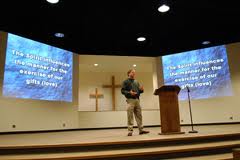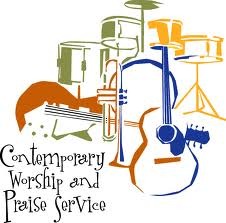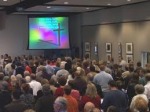 10 Ways The Church Might Change: Point 8
10 Ways The Church Might Change: Point 8
[In a previous blog I have outlined 10 possible changes the Church may face in the future. This is point 8 in the series: “To obey is better than sacrifice” the Bible says. We need to learn and exercise “sacrifice” in our Christian lives and learn to exercise “obedience” to what the Holy Spirit and the Word of God, the Bible, is saying to us as believers. America’s churches today live in abundance, losing the essence of the principle of sacrifice. America’s churches need to learn “obedience”, not only to the written Word of God, the Logos, the Bible, but to the living Word of God, the Rhema, through the Holy Spirit.”]
I love to watch the History Channel on my cable TV. My parents are in their latter 80’s, and their generation is dying off. I feel they are the last generation of Americans that really know what “sacrifice” is all about. They lived through the Great Depression of the 1930’s, where sacrifice was the norm. That prepared them to sacrifice even more to support the troops during World War II when fighting the demagogue dictators of the world to preserve ideals like democracy and freedom.  My dad sacrificed for me, doing anything he could to see I became the first college graduate in my family. He wanted me to live better than his generation, which came to be at the expense of losing the principle of sacrifice to my generation and those under me. America, today, is on top of the economic world, proudly, but with pride comes the fall. Americans are not willing to sacrifice what they have for future generations; they want it now, the plastic credit card age of obtaining immediately at paying for it later. Our children will pay for our greed as America finds itself in debt and at the mercy of its creditors. We have lost the principle of sacrifice to power, wealth, and greed, to which America needs to repent if it wishes to keep it status as a world power and influence.
My dad sacrificed for me, doing anything he could to see I became the first college graduate in my family. He wanted me to live better than his generation, which came to be at the expense of losing the principle of sacrifice to my generation and those under me. America, today, is on top of the economic world, proudly, but with pride comes the fall. Americans are not willing to sacrifice what they have for future generations; they want it now, the plastic credit card age of obtaining immediately at paying for it later. Our children will pay for our greed as America finds itself in debt and at the mercy of its creditors. We have lost the principle of sacrifice to power, wealth, and greed, to which America needs to repent if it wishes to keep it status as a world power and influence.
I Samuel 15:22 asks: “Has the Lord as much delight in burnt offerings and sacrifices as in obeying the voice of the Lord?” He answers his own question at the end of the verse: “Behold, to obey is better than sacrifice.” If we as Americans have trouble understanding “sacrifice”, how much more difficult is it to understand “obedience”? Obedience to what, you ask? Answer” “as in obeying the voice of the Lord”!
 If the 21st Century Church, the Body of Christ, the Priesthood of Believers expects to see REVIVAL, it has to relearn how to listen to “the voice of the Lord” for themselves. Every believer in Jesus Christ can be like little Samuel, who, as a young man, had to recognize that he could hear the voice of the Lord personally for himself. Levi, the High Priest, could not hear that voice even though he was in leadership at that time. He had to rely on Samuel. I remember when I personally learned that lesson, and like little Samuel, I was shocked at that possibility. Over the years I have tried to nurture, to fine tune, to hone in on that skill. I would rather sit, worship, and “listen” than stand, praise, and petition during my prayer times now, individually and corporately as a priest and as a priesthood. Listening to the voice of the Lord is a special gift only believers in Jesus Christ can have because that still small voice comes through the Holy Spirit of Jesus Christ that resides in its temple, our physical bodies. The scripture says, “Do you not know that your bodies are the temple of the Holy Spirit?” Because of this, we, believers in Jesus Christ, can hear “the voice of the Lord” individually and corporately.
If the 21st Century Church, the Body of Christ, the Priesthood of Believers expects to see REVIVAL, it has to relearn how to listen to “the voice of the Lord” for themselves. Every believer in Jesus Christ can be like little Samuel, who, as a young man, had to recognize that he could hear the voice of the Lord personally for himself. Levi, the High Priest, could not hear that voice even though he was in leadership at that time. He had to rely on Samuel. I remember when I personally learned that lesson, and like little Samuel, I was shocked at that possibility. Over the years I have tried to nurture, to fine tune, to hone in on that skill. I would rather sit, worship, and “listen” than stand, praise, and petition during my prayer times now, individually and corporately as a priest and as a priesthood. Listening to the voice of the Lord is a special gift only believers in Jesus Christ can have because that still small voice comes through the Holy Spirit of Jesus Christ that resides in its temple, our physical bodies. The scripture says, “Do you not know that your bodies are the temple of the Holy Spirit?” Because of this, we, believers in Jesus Christ, can hear “the voice of the Lord” individually and corporately.
I was thrilled when discovering and practicing this gift, but it came at a price! That price is OBEDIENCE! We can hear the voice of the Lord, but if we are not “obedient” to that voice, we become as the Children of Israel who saw salvation at the hands of 500 years of slavery to the Egyptians vanish because of one man’s, Mose’s obedience to what he heard the voice of the Lord tell him. After their salvation experience they became known as the Children of Disobedience while in the Sinai Dessert trying to walk out their salvation experience, never to reach the Promise Land. Individually, and corporately they failed! They were not willing to be “obedient” to what they “heard” from God.
 How does the Church, the Bride of Christ, the Priesthood of Believers fair today on the “obedience” meter? It is hard to say. First, they have to be “listening to the voice of the Lord” before they can be tested for “obedience”. As a child, when my parent spoke, that voice demanded blinded obedience. If not, punishment was administered to bring “correction” with the ultimate result being “obedience to that voice” in the future. As I got older, when a parental voice spoke, I jumped and reacted in “obedience”. The same is with our spiritual lives. Having the privilege of hearing the parental voice of our heavenly Father through the voice of Holy Spirit of Jesus Christ demands obedience. Disobedience brings “conviction” because of God’s “grace” rather than harsh disciple for the purpose of “correction” is the rule of thumb for a loving God. I know personally, for I have experienced being disobedient to something the voice of the Lord told me to do, and the heaviness of conviction of my disobedience is something I never want to experience again. Even though judged and condemned by my conscience disobedience, the grace of God has reconciled me, forgiven me, and restored me to the place of still being able to hear the voice of God, but now wanting to be obedient to that voice.
How does the Church, the Bride of Christ, the Priesthood of Believers fair today on the “obedience” meter? It is hard to say. First, they have to be “listening to the voice of the Lord” before they can be tested for “obedience”. As a child, when my parent spoke, that voice demanded blinded obedience. If not, punishment was administered to bring “correction” with the ultimate result being “obedience to that voice” in the future. As I got older, when a parental voice spoke, I jumped and reacted in “obedience”. The same is with our spiritual lives. Having the privilege of hearing the parental voice of our heavenly Father through the voice of Holy Spirit of Jesus Christ demands obedience. Disobedience brings “conviction” because of God’s “grace” rather than harsh disciple for the purpose of “correction” is the rule of thumb for a loving God. I know personally, for I have experienced being disobedient to something the voice of the Lord told me to do, and the heaviness of conviction of my disobedience is something I never want to experience again. Even though judged and condemned by my conscience disobedience, the grace of God has reconciled me, forgiven me, and restored me to the place of still being able to hear the voice of God, but now wanting to be obedient to that voice.
 If I personally want revival in my life, and corporately want to see revival in the Church, then I have to be willing to learn how to “hear the voice of the Lord”, and more importantly be obedient to what I have heard. God is not impressed with sacrifices, for he sacrificed His Son, Jesus, on the cross so we no longer have to do sacrifices; all he wants is our obedience! If we want revival, we need to nurture our spiritual ear to hear and our willingness to be obedient no matter the cost!
If I personally want revival in my life, and corporately want to see revival in the Church, then I have to be willing to learn how to “hear the voice of the Lord”, and more importantly be obedient to what I have heard. God is not impressed with sacrifices, for he sacrificed His Son, Jesus, on the cross so we no longer have to do sacrifices; all he wants is our obedience! If we want revival, we need to nurture our spiritual ear to hear and our willingness to be obedient no matter the cost!




















































































